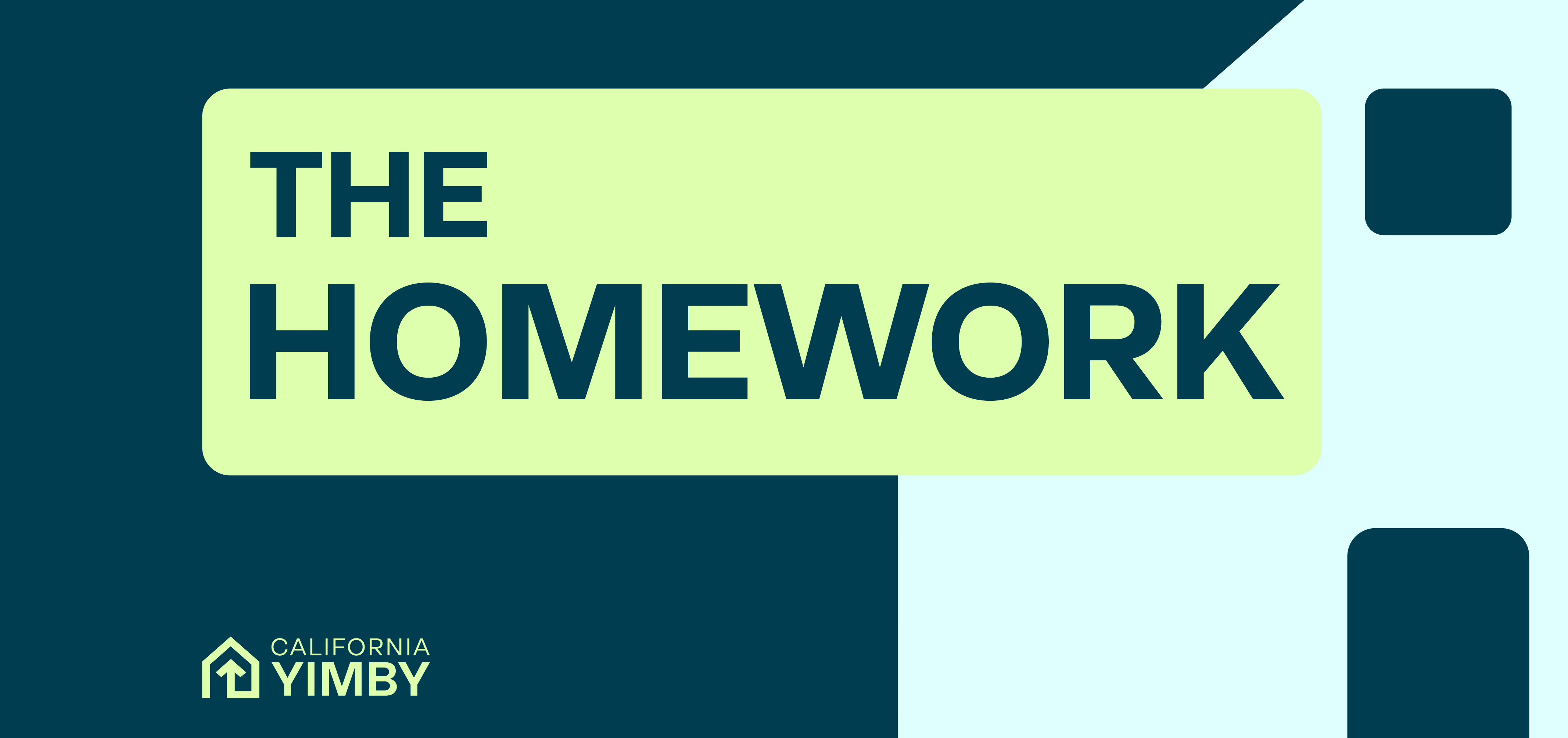The Homework: July 8, 2024

Welcome to the July 8, 2024 Main edition of The Homework, the official newsletter of California YIMBY — legislative updates, news clips, housing research and analysis, and the latest writings from the California YIMBY team.
News from Sacramento
The legislature has wrapped up their final round of policy committees, and all bills with a fiscal cost attached are now in their respective appropriations committee.
The following California YIMBY sponsored and high-priority bills are in the appropriations committee:
Sponsored Bills:
- SB 1123 (Caballero): This bill updates SB 684 (2023) to make it legal to build up to 10 homes on single-family zoned vacant lots.
- SB 937 (Wiener): This bill will authorize deferrals of impact fees and extends entitlements in order to provide developers tools to pencil out projects.
- SB 1211 (Skinner): This bill will encourage more ADUs on multifamily properties by providing more flexibility around how ADUs can be built alongside existing multifamily housing.
- AB 1820 (Schiavo): This bill will require cities to provide a precise estimate of the fees required for a proposed housing development at the time of building permit application.
High Priority Bills:
- AB 2144 (Grayson): This bill will reduce uncertainty around new home building by requiring local governments to provide evidence in their Annual Progress Reports, required by the state’s Regional Housing Needs Assessment, that they are complying with existing laws regarding transparency in impact fees.
- SB 1210 (Skinner): This bill will help to eliminate uncertainty around utility connection fees by requiring that fees are clear, transparent, and posted online.
California YIMBY also has a sponsored bill that is going straight to the Senate Floor due to Senate Rule 28.8, which allows bills to be sent directly to the Senate Floor for second reading if the Senate Appropriations Chair determines that the bill’s costs are not significant.
Sponsored Bills:
- AB 2580 (Wicks): This bill will require local governments to monitor how new historic designations could impact their ability to meet housing needs under existing state law, and report new historic buildings and districts to the California Department of Housing and Community Development (HCD) during the Annual Progress Report of the Regional Housing Needs Assessment process.
Lastly, our sponsored bill AB 3057 (Wilson), a technical fix to an existing law that will grant local Junior ADU ordinances the same exemption from environmental review that is already granted to standard ADU ordinances, recently passed the Senate Housing and is making its way to the Senate Floor.
To stay current on what housing bills California YIMBY is sponsoring, supporting, and watching, you can now use our Abstract link to track with us.
Stay tuned to future editions of The Homework, and follow the California YIMBY Twitter channel, @cayimby, to stay up to date on developments on the legislative session and related news.
Housing Research & Analysis
More Homes: Illegal in 96% of California
“How much of California’s residential land is zoned exclusively for single family homes?” is a fairly straightforward question that is surprisingly difficult to answer – because state-level data on zoning largely does not exist.
Until now. In Single-Family Zoning in California: A Statewide Analysis, Stephen Menendian, Shahan Shahid Nawaz, and Samir Gambhir publish the results of their painstaking effort to assemble data on every city in the state.
Key Takeaways
- 96% of residential land area in California is zoned single-family only.
- 91 California jurisdictions reserve 95% or more of their land for single family homes only.
- Jurisdictions with more single-family zoning have fewer nonwhite residents: cities that reserve more than 95% of their residential land for single family homes were twenty percentage points whiter than the state at large.
“Informal” Housing – It’s Not Just a Formality
California’s statewide accessory dwelling unit (ADU) reforms are an unambiguous housing policy win, enabling the permitting and construction of tens of thousands of new homes all across the state. However, legal ADU development is not the whole story: even with zoning reforms, permit streamlining, and fee reduction, many homeowners are still choosing to build ADUs without permits – or “informal” housing.
In Not (Officially) in My Backyard, Nathanael Jo, Andrea Vallebueno, Derek Ouyang, and Daniel E. Ho use satellite imagery and computer vision to identify detached ADUs that were built in San Jose between 2016 and 2020, then referenced city permit data to determine how many were unpermitted.
Key Takeaways:
- Approximately 80% of all detached ADUs built in San Jose between 2016 and 2020 were unpermitted.
- Homeowners who built unpermitted units were more likely to be poorer and living in less-white neighborhoods, with higher density and more household overcrowding.
Houser Headlines
- Reforming California’s landmark coastal law can restore balance between housing and environment
- Why Housing Justice is Key to Climate Justice
- Supreme Court gives cities in California and beyond more power to crack down on homeless camps
- Editorial: L.A. can’t become an affordable, livable city by protecting single-family zoning
- S.F. becomes first California city to miss its housing goals. The impact will be massive
- The Constitutional Case Against Exclusionary Zoning – The Atlantic
- ‘Not Sustainable’: High Insurance Costs Threaten Affordable Housing – The New York Times
- California insurance crisis called ‘devastating’ to real estate
- ‘YIMBY’ Zoning Reform Is Finding Fans at the Federal Level – Bloomberg
- UC Berkeley can build student housing at People’s Park, state Supreme Court rules
- Housing Is The Economy – by Hamilton Nolan
YIMBY Social – Top Posts

Share the good word
We welcome your ideas and feedback — send story tips and ideas to Homework@cayimby.org.